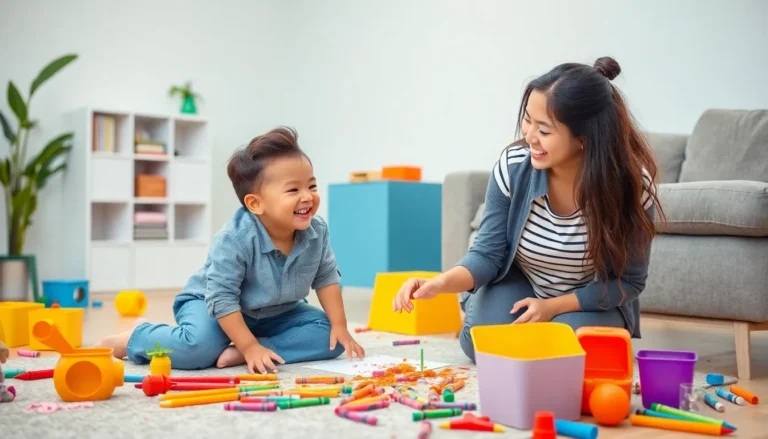Table of Contents
ToggleParenting can feel like a wild rollercoaster ride, complete with unexpected twists and turns that leave even the most seasoned parents dizzy. From the hilarious mishaps of diaper disasters to the unforgettable moments of miscommunication, every parent has their share of “oops” moments. These parenting fails not only provide comic relief but also remind us that nobody’s perfect in this chaotic journey.
Common Parenting Fails
Parenting often includes moments that don’t go as planned. These common missteps can become humorous anecdotes over time.
Overreacting to Minor Issues
Overreacting occurs when parents exaggerate responses to situations like spilled milk or minor disagreements between siblings. Such reactions can escalate tension and create anxiety in children. Parents should focus on maintaining calmness to teach children effective conflict resolution. Acknowledging the difference between significant issues and trivial ones contributes to a more relaxed environment. Recognizing when to step back helps foster resilience in children, allowing them to navigate small challenges independently.
Ignoring Children’s Emotions
Ignoring children’s emotions can lead to feelings of inadequacy and confusion. Parents often dismiss outbursts instead of acknowledging what their children feel. Validating emotions teaches kids that their feelings are important. Supporting open conversations about emotions encourages children to express themselves without fear of judgment. Facilitating an emotional vocabulary equips children to communicate effectively, promoting a healthier emotional landscape. Listening attentively enhances trust and strengthens bonds between parents and children.
The Impact of Parenting Fails

Parenting fails significantly affect children and family dynamics. These moments, while often humorous in hindsight, create moments that resonate beyond initial laughter.
Emotional Consequences for Children
Children experience deep emotional consequences from parenting fails. Overreactions to minor incidents can instill fear and anxiety, leading to insecurity. Ignoring children’s feelings during tough moments fosters confusion and feelings of inadequacy. Children who grow up questioning their emotions may struggle with communication later in life. Validation of emotions, instead of dismissal, creates a safer space for expressing feelings. Those who learn effective emotional expression develop resilience and self-confidence. Open conversations between parents and children enhance emotional support and understanding.
Long-Term Effects on Family Dynamics
Long-term effects on family dynamics arise from consistent parenting fails. Frequent miscommunication can create tension among family members. Children witnessing their parents dismiss each other’s feelings may mimic these patterns. In time, poor communication limits collaboration and solidarity within the family. Establishing a foundation of trust and understanding allows families to work through conflicts more effectively. Respectful dynamics foster healthier relationships that last well into adulthood. Successful adaptation and growth arise from recognizing and addressing past parenting errors.
Learning from Parenting Fails
Parenting fails present opportunities for growth and understanding. Recognizing mistakes fosters resilience and improvement for both parents and children.
Acknowledging Mistakes
Recognizing errors is the first step toward effective parenting. Parents can reflect on their reactions during challenging moments. They can consider how these moments impact their children’s emotional well-being. Immediate acknowledgment encourages open discussions, reducing misunderstandings. Children often sense when parents hold onto their mistakes, making it crucial to express regret. Sharing feelings of inadequacy can strengthen trust within the family. Honest conversations lead to healthy emotional expression and build stronger bonds.
Strategies for Improvement
Implementing strategies enhances parenting effectiveness. Prioritizing self-care allows parents to approach challenges with a clear mind. Practicing mindfulness helps in managing emotions during stressful moments. Establishing routines fosters stability and predictability, which benefits children. Encouraging consistent communication strengthens relationships and nurtures understanding. Utilizing resources such as parenting workshops or counseling provides additional support. Setting realistic expectations prevents unnecessary pressure and promotes a positive parenting experience. Reinforcing these strategies cultivates resilience within families, enabling parents and children to navigate future challenges successfully.
Sharing Stories of Parenting Fails
Everyone encounters challenges in parenting, and sharing these stories promotes understanding and connection among parents.
Lessons Learned from Real-Life Experiences
Parenting fails offer valuable lessons for growth. Mistakes such as forgetting to pack a snack can become teaching moments about preparation. Ignoring a child’s feelings during a tantrum highlights the importance of emotional validation. These experiences invite parents to reflect and adjust their approaches, fostering resilience in both themselves and their children. Embracing these lessons cultivates stronger family bonds. When parents share their stories, they not only lighten the mood but also encourage others to reassess their methods and strive for improvement.
The Humor in Parenting Fails
Laughter often accompanies parenting fails, turning challenging moments into shared joy. A toddler’s unexpected art project on the living room wall or a well-timed meltdown in a grocery store creates contagious humor. Such incidents exemplify the unpredictable nature of parenting, reminding everyone that imperfection exists. Finding humor in these mishaps eases stress and reinforces the idea that it’s okay to not be perfect. Sharing these funny stories fosters connections among parents, creating a supportive environment where everyone can relate. After all, these moments add an entertaining touch to the exhausting yet rewarding journey of parenthood.
Parenting is an unpredictable journey filled with both challenges and joys. Embracing the humor in parenting fails not only lightens the load but also fosters deeper connections among families. Acknowledging mistakes and sharing experiences can transform these moments into valuable lessons.
By validating children’s emotions and maintaining open lines of communication, parents can cultivate resilience and trust. This approach not only strengthens family bonds but also equips children with essential skills for navigating life’s ups and downs. Ultimately, the path of parenting is about growth and understanding, reminding everyone that it’s okay to be imperfect.








